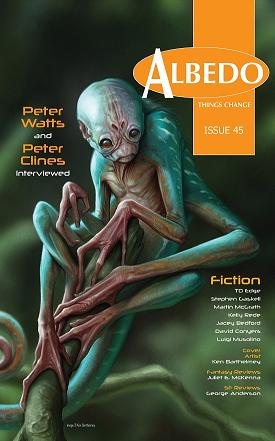Reviewed by Clancy Weeks
“The Woman Who Could Choose the Stars” by T.D. Edge is a love story at heart, where we meet a cute couple of would-be lovers, Henry and Susan, who are engaging in that most complicated of dances. The real question by the end is: Who is in love with whom? Henry is “not from around here,” and it is Susan’s love for herself that eventually sinks another of her relationships, destroying her chance to leave with Henry when he has to return to his world. I like the writing in this little work, but as with much SF these days, it fails the test of my definition of SF: Does the story work if we remove the SF elements? If the answer is “yes” then it is not SF to me. Here, the SF elements just aren’t necessary to the story.
Stephen Gaskell’s “Landscapes of the Martian Heart” is a heartbreaking tale of a mother’s love against the unforgiving environment of the planet Mars. When Kate discovered she was pregnant during the trip—a highly unlikely scenario, but go with it—she could have terminated, but chose instead to have the baby on a new world. The results, as it turns out, are disastrous. The child, Chloe, is afflicted with an irreversibly degenerating skeleton, doomed to a short life on a world that is not her own. Kate steals a biodome and supplies to set up a small patch of Earth to show her daughter before she dies. I won’t spoil the ending, as that is the point of the tale, but as a father I found it to be a painful read. Still, it’s a good story, and the writing is strong. I hope to see more from this author in the future. Recommended.
In “King Rook,” Martin McGrath weaves a wonderful tale of the nature of free will. Young Mr. Connolly—known as “Tonto”—has lived a life protected, either by the titular King Rook, or his uncle Seamus. Each has both taken and bestowed gifts, never asking permission or offering a choice. Connolly is on his way to university, but before he can leave he must perform one more service for his protectors. I can’t decide if this story fits in the horror category or if it is just straight fantasy, but it doesn’t matter much as it is well-written and finely-told regardless. McGrath paints a very nice picture of life in Ireland, and of the choices people there make every day on the lower end of that society. Be advised, though, there are a few minor editing errors, but they don’t really detract from the story itself… they just bug me.
“The Pageant” by Kelly Rede is a gripping tale that answers the question, “what is the logical extension of the child beauty pageant industry?” Andy is a trainer for that industry, and he has some very strange ideas about protecting his “children.” In the end, this story is your basic fairy tale with the requisite happy ending… or is it? Rede manages to turn much of the trope on its head, and the whole thing is a bit chilling. I expected a much more sinister plot and ending, but was pleased that my fears of another “same old, same old” were not realized. Very nicely done.
If it’s true you can’t go home again, it is also true that, sometimes, you just can’t &^%#@## leave, either. In “Root and Branch” by Jacey Bedford we get a nice little short-short about the latter. John Rawcliffe has seen the world, and wants the same for his son and grandson, but the old oak tree has other ideas.
David Conyers, in his story “The Shaping Man,” gives us a look into a near future ravaged by world war fought with biological weapons. The viruses unleashed by both sides have the ability to erase—in real-time—objects or people from our perception. Trent Kinkaid has not seen his wife, Penny, or his daughter, Lily, since he first became infected, even though none of them ever left their home in the desert of Australia. As a husband and father, he is obsessed with protecting his family regardless of whether or not he can see their faces or hear their voices. He can perceive them only as formless shapes in his field of view, and the virus won’t allow even the character of their voices to be heard. Into this tableau Brian Volkmer comes, with knowledge of Trent’s world both without and within his compound. I am reminded of Cormac McCarthy’s The Road with Trent’s need to protect his family, and while I knew where this was headed from the beginning, that did not dampen the horror one bit when this story finally got there. Recommended.
“The Stag” by Luigi Musolino is a mythical beast, known as Gl’Cierv, and old Bucci has been hunting it ever since his first encounter with it took the life of his brother. Omar is a young man who has stumbled into the narrative, and is at first only interested in the story. As a horror story, it sort of works, but for the most part draws a big “meh” from me. As an allegory dealing with issues of the conservative mind-set that nature must be tamed and expoloited, versus the youthful exuberance of conservation and species protection, it works. Of course, I might be reading too much into this tale, but I like to think there is more here than just a bland horror story.
Clancy Weeks is a composer by training, with over two-dozen published works for wind ensemble and orchestra, and an author only in his fevered imagination. Having read SF/F for nearly fifty years, he figured “What the hell, I can do that,” and has set out to prove that, well… maybe not so much. He currently resides in Texas, but don’t hold that against him.
 Albedo One
Albedo One